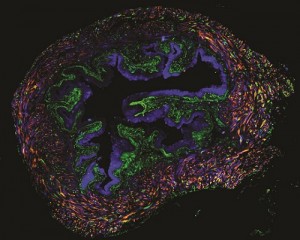April 21st, 2014
Invasive bladder cancer is a grim disease that is expensive to treat and requires ongoing monitoring due to its high probability of recurrence. Stanford developmental biologist Philip Beachy, PhD, and urologist Michael Hsieh, MD, PhD, wanted to know how the cancer starts, and what makes it so intractable. Their research was published yesterday in Nature Cell Biology (subscription required).
We’ve learned that, at an intermediate stage during cancer progression, a single cancer stem cell and its progeny can quickly and completely replace the entire bladder lining. All of these cells have already taken several steps along the path to becoming an aggressive tumor. Thus, even when invasive carcinomas are successfully removed through surgery, this corrupted lining remains in place and has a high probability of progression.
"Although the cancer stem cells, and the precancerous lesions they form in the bladder lining, universally express an important signaling protein called sonic hedgehog, the cells of subsequent invasive cancers invariably do not — a critical switch that appears vital for invasion and metastasis. This switch may explain certain confusing aspects of previous studies on the cellular origins of bladder cancer in humans. It also pinpoints a possible weak link in cancer progression that could be targeted by therapies."
"This could be a game changer in terms of therapeutic and diagnostic approaches. Until now, it’s not been clear whether bladder cancers arise as the result of cancerous mutations in many cells in the bladder lining as the result of ongoing exposure to toxins excreted in the urine, or if it’s due instead to a defect in one cell or cell type. If we can better understand how bladder cancers begin and progress, we may be able to target the cancer stem cell, or to find molecular markers to enable earlier diagnosis and disease monitoring."
Source: Stanford Scope http://scopeblog.stanford.edu/2014/04/21/cellular-culprit-identified-for-invasive-bladder-cancer-according-to-stanford-study/
Cancer, Research, Science, Stanford News, Stem Cells











